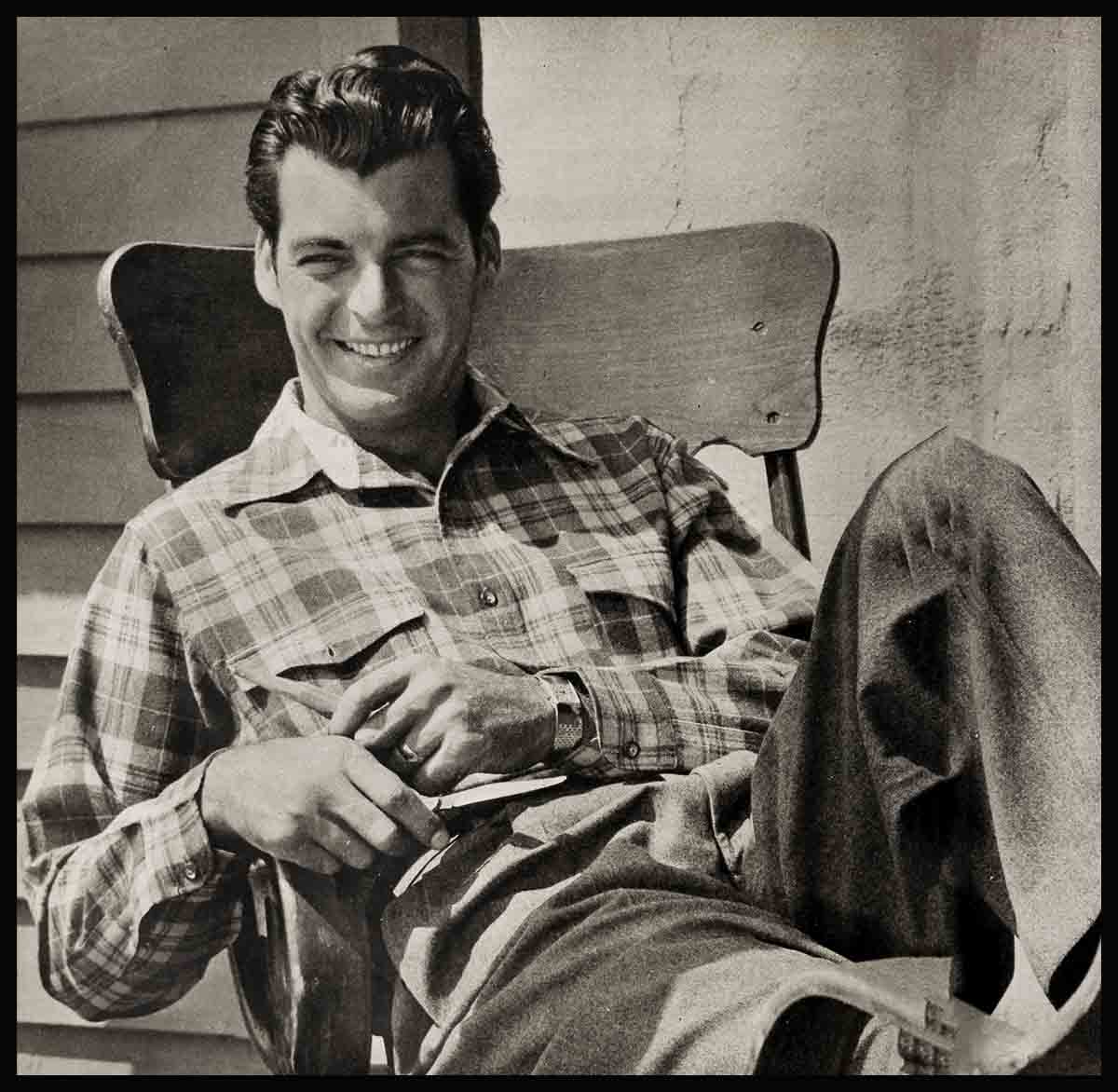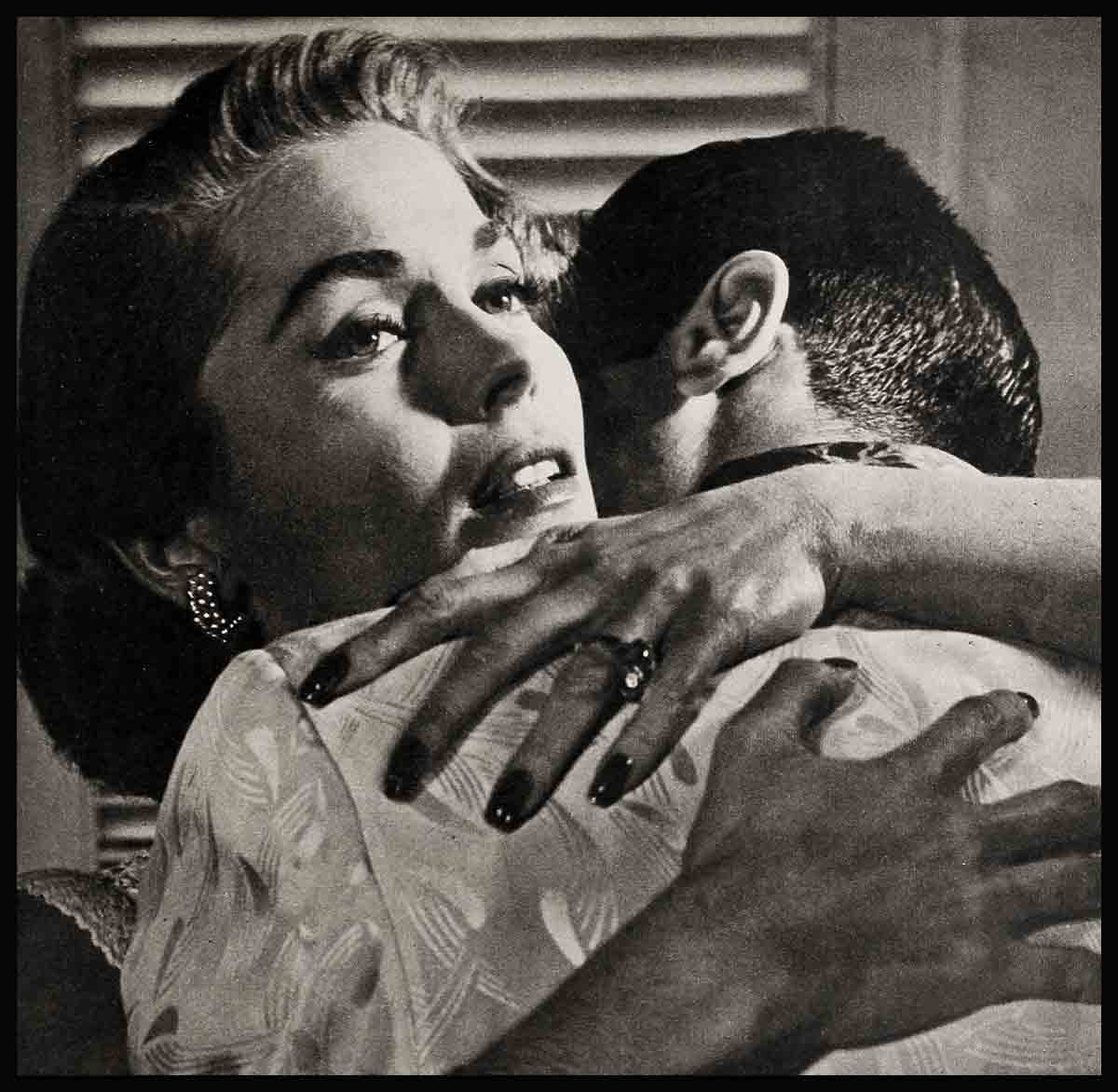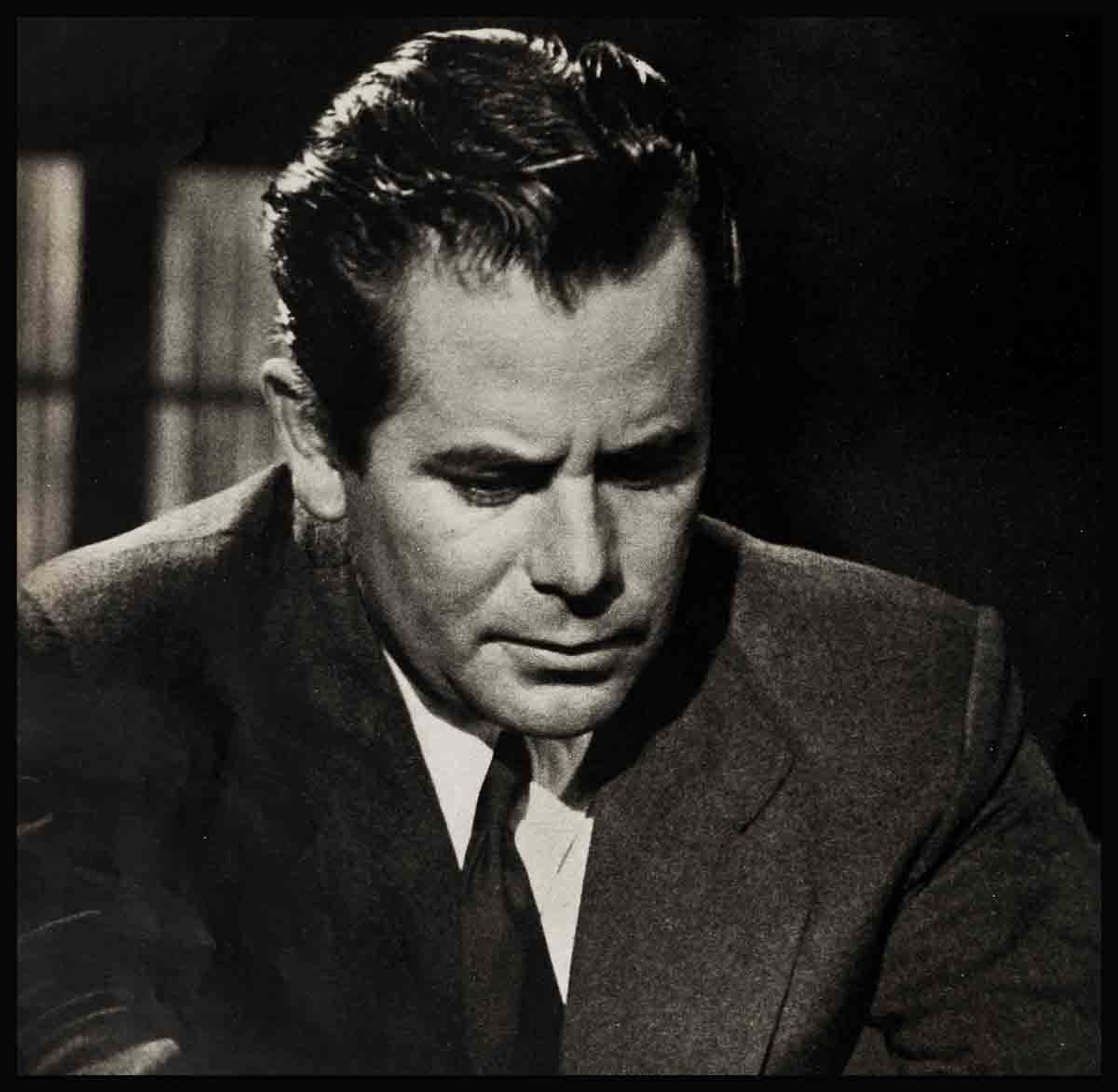
Untying The Apron Strings—Sandra Dee
The telegram arrived, signed with an important industry name, inviting Sandra Dee to teenage party at a big hotel. She held it in one hand, tapped it with her long silver-platinum enameled nails, and meditated. “I don’t think I’ll go,” Sandra told her mother, Mrs. Eugene Douvan.
“Sandy, why not? It sounds like a wonderful party to me.”
“I’m not going; I just have a feeling about it . . . “ Still, I hate to hurt anyone by refusing. But there’s something odd about it,” Sandy mused.
“So, now you’re going psychic on me,” Mrs. Douvan sighed. “What could be odd about an ordinary telegram? You’ll get to meet some new kids; you’ve worked so hard with final exams and finishing up the picture. Anyway, Saturday’s a good night. You can sleep late Sunday . . . why not go and enjoy yourself?”
Just then the phone rang. It was the man calling, saying he hadn’t sent the invitation but had heard someone was using his name!
Telling about it, Mary Douvan said, “Sandy has the most amazing intuition about things. That’s certainly something I’ve never taught her. Her instinct is her only guide as to what she does in her career and her social life. Sandra thinks everything over carefully and sometimes she proves that mother doesn’t always know best. Now, if only Sandy could get her intuition working on the Case of the Weekly Quart of Ice Cream!”

It seems that every Saturday night for the past two months an unknown youth has deposited a quart of strawberry ice cream at her front door. It comes from the most expensive ice cream shop in Beverly Hills and so far they’ve been unable to trace the mysterious donor.
Those meeting Sandra and her mother for the first time are both amused and amazed at the relaxed relationship between them, which is akin to that of two schoolgirls. Petite, 99-pound Mrs. Douvan, is a very attractive doll-faced brunette who looks scarcely older than her 17-year-old daughter. So, it’s understandable that Sandra, who used to call her “Mom” or “Mommie,” now sometimes affectionately calls her “Butch.”
It was Butch who urged Sandra to accept the invitation to the high school prom after her recent graduation. But Sandra (who hadn’t attended a high school but had had a private I he at the studio) was hesitant, fearful that she wouldn’t know anyone there. She also felt that the boy who had invited her—he was president of the class—was doing it as a duty and didn’t really want to take her. “Mom,” Sandy explained, “insisted that I go, and the argument got louder and louder until we were deadlocked on the issue. Finally, I said I’d talk it over with my teacher, Miss Gladys Hoene; she often helps me decide things. Really, she’s like a second mother to me. With both of them in favor, naturally I went. And I had a wonderful time; danced every dance, and didn’t feel at all strange. I must have had rocks in my head when I worried so,” Sandra grinned.

Thousands of words have been written about her alleged reluctance to date in Hollywood and her lack of girl friends. The answer to this can be found in the fact that she’s made eight films during a breathtaking, partly overlapping schedule (“some mornings I didn’t even know for sure which picture I was reporting for.”) This, in addition, to carrying a full load of high school work with excellent marks. Earlier, in New York, at 13, with the type of face which could be photographed to appear either childish or mature, the exquisite and determined little model was earning up to $50 an hour, posing for magazine art and TV commercials. “We thought she would work maybe once a week after school but it turned out to be six bookings a day,” sighed Mrs. Douvan. “Keeping up with her on the appointments exhausted me, but Sandy was never tired.”
Just where would this hectic schedule leave time for girlish chatter after school or dates at night?

It’s significant, however, that when Sandra attended public school, in her pre-modeling days, she was just as determined to be in on everything in school and president of most of it. At 11, she was boy-crazy, and set about making herself a femme fatale of the ruled-paper set. “Sandra sends notes to boys and talks too much—especially to boys!” her teacher complained to Mrs. Douvan.
Today, it’s Mary Douvan who complains that her beautiful daughter doesn’t date enough. “There is no pushing her and no stopping her in her work,” admits Mary. “She’s a perfectionist who always knows what is best for her. In dating, she’s a perfectionist, too. She doesn’t go out as much as most girls because, for Sandra, a date must be something real special. Going out merely because of boredom wouldn’t occur to her; her life is too full of things. I, myself, have loads of friends, but that girl of mine would rather have one true friend than 20 casual ones.”

So far, Sandra hasn’t fallen in love but, like any teenager, she’s had innumerable crushes on older men—Raymond Burr, Rock Hudson, Stewart Granger, Rex Harrison and Paul Newman.
“Older men, well, they’re simply fascinating.” sighs Sandra, happily. “Sometimes I’m in love with three at a time. I saw ‘Cat On A Hot Tin Roof’ five times because of Paul. Oooh, those aquamarine eyes of his . . . they look right through you! Whenever he came near me on ‘Until They Sail’? I’d blush. And when I blush even my ears turn red. “I just hated Joanne Woodward for a month after they got married. Then one day I said to myself, ‘Oh, pooh, let her have him,’ and I transferred my affections to Rex Harrison, saw him four times in ‘My Fair Lady.’ ”

Curious as to the meaning of these sudden crushes, Sandy consulted her mother. That experienced lady told her that kind of admiration was harmless—really meant that Sandy wasn’t yet ready to fall in love and was only playing at it with improbable and impossible suitors. So now Sandy’s rule is: If at first you fall in love—don’t!
The chestnut-eyed young charmer adores getting all gussied up in one of her dozen formal gowns, very high-heeled pumps and champagne mink stole; her corn-silk silvery hair in a sophisticated up-sweep, dangling gold and pearl bracelets and fine gold earrings. “I love big, splashy premieres as much as any tourist.” grins Sandy. “I get so excited seeing what everybody is wearing and who’s there that I must go back later to really see the picture!”

A big problem for perfectionist Sandy was what to wear to the elegant graduation party producer Ross Hunter gave for her at his home. And then she was off to New York alone—a graduation gift from her mother. “I’ve always gone with Sandra everywhere before.” says her suddenly serious young mother, “and now the time is coming when Sandy must learn to be on her own. Of course. she’ll visit our relatives and have a girl friend staying with her at the hotel part of the time, but still I’m worried, like any mother, as to how Sandy will react to independence. And I realize that maybe with our too close association I’ve pampered and spoiled her some. It won’t be long before she’s 21 and will really be on her own. And I’ll have to make a life for myself, too. It’s a painful process—this untying of the apron strings. She’s never had the kind of childhood most girls have; she’s missed out on lots of things because of her modeling and now her picture work. But, looking at it another way, she’s gained so many things, sometimes I feel she should just count her blessings.”
Although this highly-capable youngster has made all her own career decisions, she has never known what it means to be on her own. Up until now, this was one of the things her mother never had occasion to teach her. For Eugene Douvan, Sandra’s step-father, was a wealthy, commanding, somewhat autocratic, but loving father and husband—one who took complete charge of their lives. The three were inseparable, always among the elegantly dressed first-nighters at Broadway openings, the Met and ballet. They dined at the de luxe restaurants. And Sandra was always with them. She and her mother worshipped Eugene Douvan, and his untimely death, three years ago, left them utterly desolate.

Circumstances matured Sandy in many ways, yet she is still a strange contradiction of child and woman. Her unusual childhood has made her more poised, more socially assured than other motion picture actresses of her age; she has no worries about how to talk to an adult or what fork to use. So she wasn’t particularly worried about registering at a swank New York hotel on her trip or meeting the press and photographers there. “But how I’ll ever get myself up in the morning I don’t know,” she exclaimed, eyes wide, as she removed the dark glasses (worn against the smog.)
“I loathe getting up in the morning as much as I hate going to bed,” continued Sandy. “I’m a walking Zombie in the morning and if Butch didn’t lay out the clothes I’m to wear, I’d never get to the studio on time. The packing and unpacking, too, will be murder. I hate to say it, but I’m a most untidy person. Butch tries to teach me, but like a measles innoculation, it never takes. When I finish with anything I just leave it. Towels get draped over lamps when I rush to answer the phone. My favorite bracelet is likely to be on the refrigerator where I left it when I was fixing dinner. I’m always in such a hurry and so anxious to get on to the next project that everything gets into one grand mess!”
Mrs. Douvan, too, has a few well-chosen words to say on that subject. “It’s the one thing we mostly quarrel about,” the vivacious Butch admitted. “If I complain—and I do, Sandy says, “Well, I’m not perfect; I’m just a growing girl. You wouldn’t want to live with an absolute genius, would you? I don’t mind picking up after Sandy, but sometimes I decide I’ll just teach her. So when she asks for a particular sweater or scarf, I tell her to look for it herself. But when I see her rooting through the neatly-arranged dresser drawers, I can’t stand it and get what she wants myself.
“One night Sandy went to a party in a beautiful new gown with a zipper in the back. I’d gone out to visit friends and when Sandy returned, she phoned me in a tizzy, saying she couldn’t unzip the zipper, and she was going to sleep in the dress because she was dead tired and had to be up early in the morning. I told her I’d be home as soon as I could; that she must not go to sleep in that lovely dress. When I arrived, there was Sandra sound asleep in bed with the dress on!
“Even as a little girl she was terribly particular about what dress or what hair ribbon she wanted to wear. Everything had to be just so. And then, when she was through with it, there it would be on the floor.”
By most standards, Sandra would be called extravagant in the matter of clothes. As far removed from the Beatnik type as possible, she believes that an actress should always be well-dressed in public Joan Crawford and Lana Turner are her models. The fragile little star (all of 93 pounds and looking as if a good-sized breeze could blow her away) has more sweaters and skirts than she can count dozens of dressy outfits and enough shoes to stock a shop. But in the matter of extravagance, she cannot be rated on the basis of the ordinary teenager because Sandra earns so much more than they do. She admits that she likes high-style clothing, far too sophisticated for her age. And if permitted, she would wear ’em, too.
It was only last summer that Mrs. Douvan allowed Sandy to buy her own clothes. “I was amazed at her excellent taste, at the chic and becoming things she picked out,” Mrs. Douvan commented. “Now, she can shop for me better than I can. She’ll come home, all smiles, saying he’s bought me a present. I’m pleased, naturally, but that little schemer has also bought herself a couple of dresses—uses by present as an excuse for her extravagance. She never questions herself or her decisions. Even when shopping, if she buys too tight shoes or something in an unbecoming color, she’ll say, ‘No, I’m not sorry. At least, now I know what not to buy in the future.’ ”
There were two things Sandra wanted above all—a T-bird on her 16th birthday, and a house with a swimming pool. Now me has both. The house, an elegant hill one, Sandra adores. The four-seater Thunderbird she’d like to trade in for a foreign sports car. “But I’ll never yet it,” moans Sandra, “not even if I turn blue.” Sandra, though, can be tremendously persuasive, and chances are good that she’ll get what she wants soon.
She has, too, a mind of her own. And showed it, even as early as four years old. Mrs. Douvan remembers the time the determined little tot wouldn’t eat her real. Arguments and promises of gifts failed; nothing would change her mind. Mrs. Douvan knows better now, but then she says, “I could stuff all the cereal I wanted into her mouth, and she’d just keep it there until her cheeks puffed out and she turned blue in the face.” Through the years Sandy’s capricious appetite has been a battleground between mother and daughter. At present, they’ve declared an uneasy truce.
But for Sandra’s abilities, confidence, stamina and self-discipline, Mrs. Douvan has only admiration. She’s never understood how her daughter could study with both the radio and TV on. “It’s easy,” Sandy grins, “if you have the sound on the TV set turned off and if you have enough gum to chew!” It was easy, too, for Sandy to learn to drive without driving lessons. She’d watched friends drive, practiced with a girl friend for a half-hour up and down hilly Beverly Glen, then passed her driving test with flying colors. “It took me months to learn,” says Mrs. Douvan, “and then I flunked the test three times. What are you going to do with a girl like that? It’s enough to give anyone an inferiority complex.”
Sandra Dee hasn’t done that with a most eligible and handsome young actor—Edd Byrnes. Of her, Edd says enthusiastically: “Sandra has one of the freshest, dewiest faces to turn up in Hollywood in a long time. She’s been in a number of big pictures, and you might expect that she’d be acquiring some measure of sophistication by now. But not Sandra—she’s still as breathlessly thrilled by everything that’s happening to her as Alice was, dropping into Wonderland. I was on a television show with her not long ago, and was enchanted by her wide-eyed awe at it all. Done sincerely by the right type (which Sandra Dee most certainly is), this can make a fellow feel ten feet tall.”
Mary Douvan is a devoted mother. She’s teaching her daughter everything she can so that by the time Sandra is ready to vote, the little beauty will have bridged the gap between adolescence and maturity. And such open admiration as expressed by Edd Byrnes should convince her of the fine job she’s doing.
THE END
—BY MAXINE BLOCK
It is a quote. SCREENLAND MAGAZINE NOVEMBER 1959





No Comments